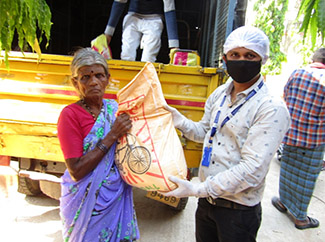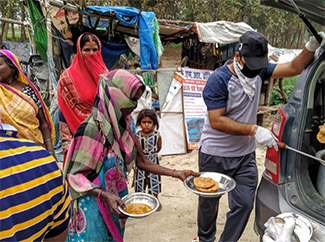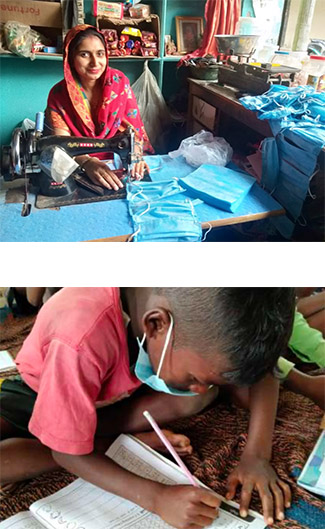consent_cookie
Duración: 1 year
Stores the user's cookie consent state
16-10-2020
On March 25, the government of India decreed a state of confinement throughout the country, as a result of the coronavirus pandemic. This measure, although essential, meant in practice for a large part of the most vulnerable population not having a job, not having income and not having the resources to survive.
In addition, while the media insisted on hand hygiene as a fundamental measure to try to curb the spread of the virus, a part of the population in India does not have regular access to running water and soap. A paradox that has been repeated in many other places on the planet.
Humana People to People India's response to confinement measures
Faced with this scenario, the Humana People to People India (HPP India) team immediately went to work to try to stop the effects of confinement and the pandemic in the communities where it is present. In the first place, he drew a map in which all the team members were located, trying to have updated information on the health situation in each area and who was in charge of each office and project unit at that time.
The management of HPP India also tried to enhance internal communication at all levels, launching an informative bulletin for the organization's staff, which is now weekly, but which was daily for the first three months after the entry into force of the lockdown.
In addition, a guide was written with prevention measures and information on how to move when strictly necessary. And most importantly, on how to help the people involved in the projects and the migrant workers present in the districts in which HPP India works, who were prevented from returning home by confinement.
Another measure was to enhance communication with partners and donors. At the same time, different crowdfunding actions were launched through social networks in order to gather resources to allocate to the most affected populations.
All this within a strategy that had to ensure the sustainability of Humana People to People India itself. To do this, budgets were reviewed and the necessary adjustments were made considering the new, unknown and difficult scenario. It must be taken into account that the organization is present in 14 states of the country, with projects in which two million people are involved every year. Likewise, with the outbreak of the pandemic, anti-COVID initiatives were launched in 13 states and a total of 55 districts.
Actions carried out from April to July
This battery of measurements resulted in:
The temporary closure of schools due to confinement made it necessary to activate different measures in order to continue with the educational programs. For this reason, online training was promoted in those cases where it was possible, giving support to students also through WhatsApp and Google Meet, in order to evaluate their progress. In the case of students who did not have a smartphone or internet connection, the support was made by phone.
Current situation
To date, the activity of the projects has been resumed, with the appropriate adjustments, in a coordinated manner with the different partners. Specific measures have been taken, such as a reorganization of visits to communities and a reduction in the duration of meetings. The projects have incorporated early warning systems and procedures following the recommendations of the Indian government and WHO. Internally, team meetings and training take place virtually.
Digital tools applied to educational programs continue to be promoted. In the case of Kadam, the "My home my school" program has been introduced, in which classes are held at home, with a maximum of 10 students. It is the teachers who travel to the communities for this. Classes in fashion and sewing and computer science, which require sewing machines and computers, are held in more spacious classrooms to ensure social distancing.


